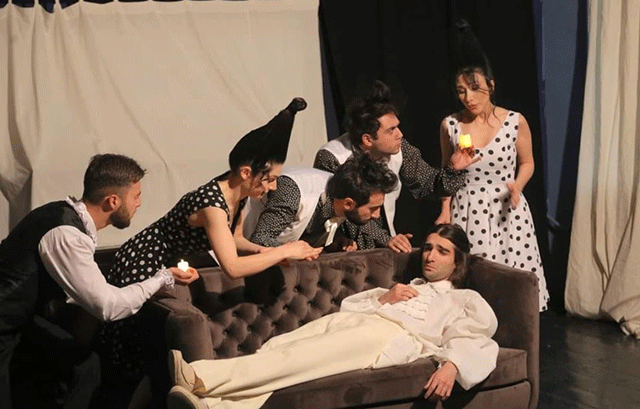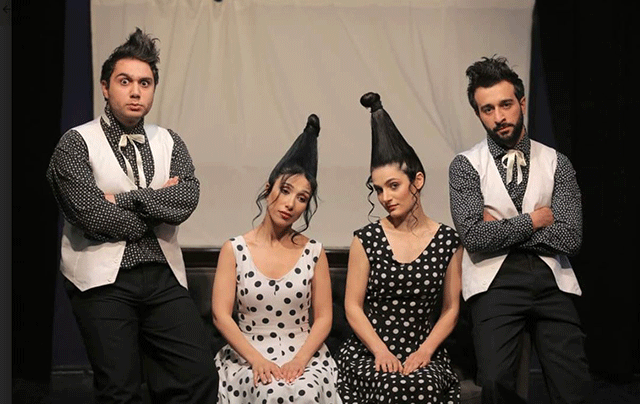Modern theatrical art involves constant change, the courage to try out new professional approaches, and the willingness to experiment. It is an undeniable fact that the dramaturgical basis is important for the success of every performance. And it is the dramaturgy that dictates its requirements, thus defining many and many creative elements as well.
In recent years, the program of the Sos Sargsyan Hamazgayin (Nationwide) State Theater in Yerevan seems to have been divided into two parts: performances played on the stage and theatricalized readings played in the rehearsal room.

If Eugene Ionesco’s The Lesson, William Saroyan’s Tracy’s Tiger, Israel Horowitz’s Remarks, and David Ivesy’s Venus in Furs theatrical readings can be in the stage reading genre existing in the theater world, then the Austrian playwright and novelist Arthur Schnitzler’s Pieretta’s Veil (director: Yuri Kostanyan, translation: Karine Tsaturyan) the play is presented to the audience from a completely different perspective. The role of the author is quite respectable here.

An author who intervenes in the action with her words (actress Tatev Ghazaryan) with a special accent, with a special voice tone for the characters. An author is an active person at the same time, and on the other hand, her presence is highly conditional. She exists for the audience, but the actors «do not notice» her, with a few exceptions, of course.
Two acts of five scenes each. An ongoing process that keeps young actors on top. The play Pieretta’s Veil, written in 1901, is one of the revolutionary plays of the theater. It was once reflected by V. Meyerhold (Columbine scarf) and A. Tairov (Pieretta’s Veil). It should be noted that in the 19th century, the topic of suicide was no less popular.

Suicide, as a fashionable gesture, gradually became part of real life. The theses are as follows: the beloved is a beautiful dream, an unfaithful wife, art is more real than life, and love is equal to death. And the bride’s wedding veil is at least a life cover for the groom.
The theatrical task of Pierrette’s Veil is quite laconic: to present pantomime not as a variety technique, but as a means of dramatic expression. In other words, to play a complete plot without words. This is the form of «theater of movement», which is the final result of dance, pantomime, and speechless dramatic play.

The play, full of pantomime images, was effectively performed on stage. Pierreta’s Veil, presented by Hamazgayin Theater’s young performers, becomes an original process in which they each return to you everything they got personally, from thoughts to sentiments, perception to consistency.
The emotive actions and situations in this play are made using a combination of pantomime and dance parts (dance by Aelita Gevorgyan), which made the stage performance of the play significant. The tragic line of Pierrot (Andranik Mikayelyan), the dramatic Pieretta (Zhanna Velitsyan), and the fatal Harlequin (Sargis Rustamyan) begins with the grotesque of «Piero’s friends» and «wedding guests» (Pieretta’s father Stepan Ghambaryan, mother Armine Andreasyan, Fred by Harutyun Sargsyan, Floresta by Misha Hakobyan, Annette by Aelita Gevorgyan, Aylumet by Maria Seyranyan, Gigolo by Hayk Petrosyan).
Is this a tragic grotesque about the torment of souls in love in a cruel world and the sufferings of an artist, or is it a story woven into the eternal triangle of real and apparent love? In this case, there is no certainty.
The theatrical reading of Pierrette’s Veil is almost as good as the play performed on the big stage. Here, the subtleties of the stage director are preserved, there is a certain limitation of time, action, and space, certain conventions, vividly expressed characters with characteristic traits, life images, and insatiable desire for love.
Pierrette’s Veil is a confession, perhaps inaccessible, but containing many of life’s problems that are still relevant today.
The power of love never fades, and in many cases, love is considered a problem. But love is the basis of human and moral character. It is something that cannot be stolen if held tightly to.
Vova Arzumanyan
Credits to Shant Sevag
























































